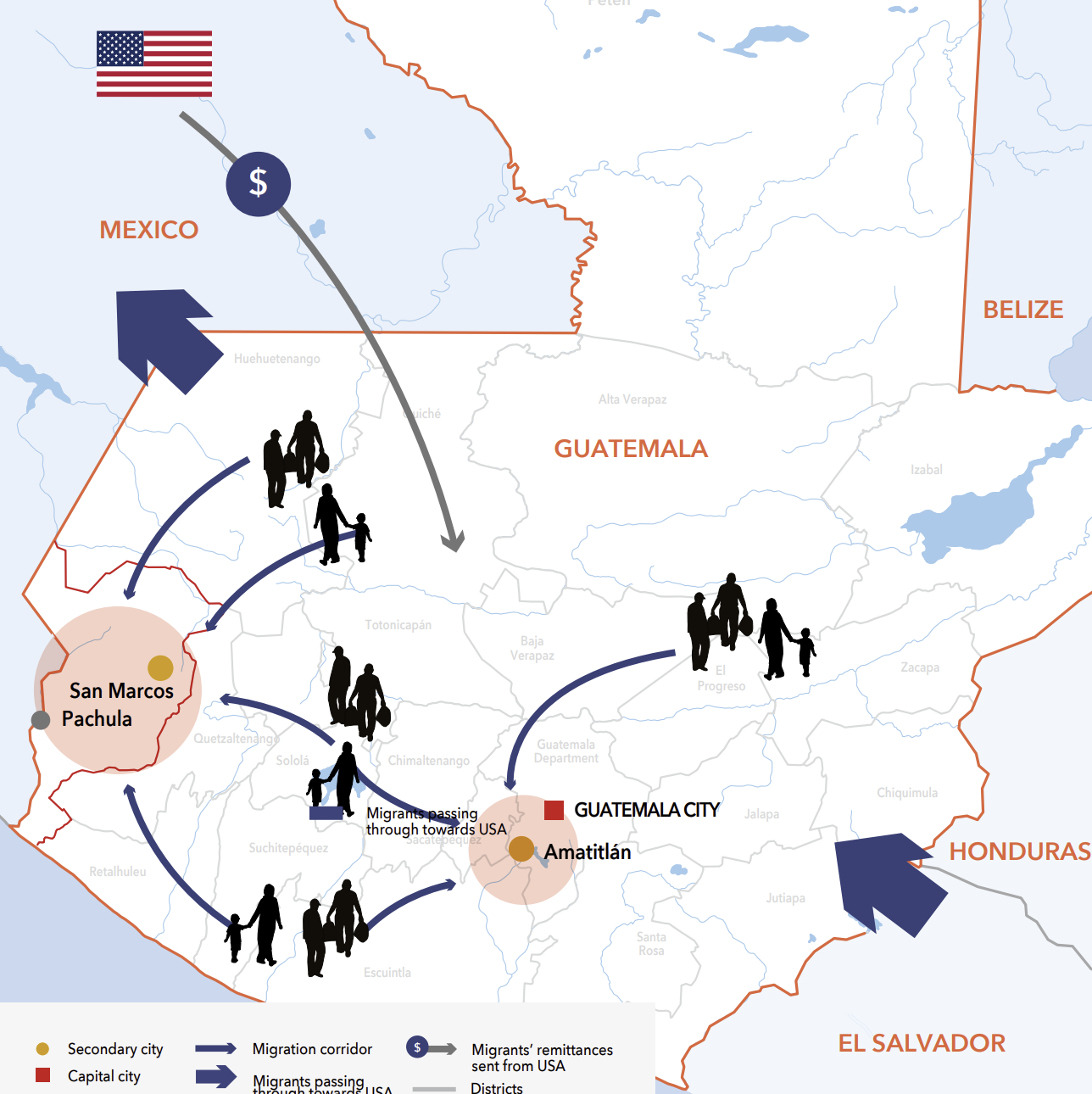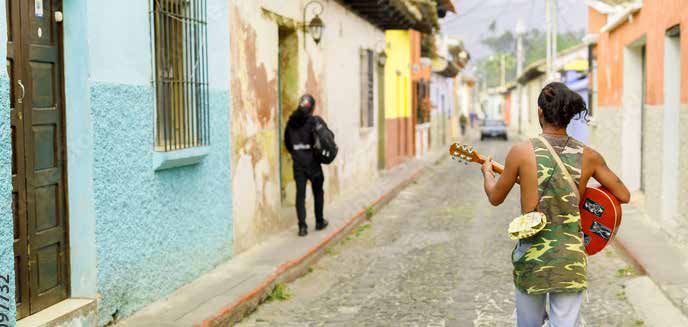Remittances address a critical need in Guatemala. Beyond helping households meet current needs, they enable investment in housing, education, and nutrition, which in turn improve a person’s earning capacity over a lifetime.
Although remittances play a crucial role in helping meet basic needs, they have not been leveraged to foster local economic growth and financial security among vulnerable populations.
This innovative project promotes economic opportunities and financial inclusion of poor migrant and host community households in Guatemala, especially people of Mayan descent.
Migration in Guatemala
Nearly two of every ten Guatemalans intend to migrate, with poor economic conditions among the most material push factors.
Persistent economic insecurity among large and traditionally vulnerable populations is driving this migration, especially in its Western Highlands.
Research shows that most Guatemalans have a relative living abroad; in rural areas, 74% have family in a foreign country.

Partners
- Inter-American Dialogue (IAD)
- Four financial partners (Airpak, Banrural, Banco Industrial, and Micoope)
- Eight Mancomunidad de Municipios de la Cuenca del Río Naranjo (MANCUERNA) municipalities
- Four public schools (Instituto Nacional de Educación Básica San Cristóbal Cucho, Instituto de Educación Básica Por Cooperativa Palo Gordo, Instituto de Educación Básica Por Cooperativa San José El Rodeo, and Instituto Nacional Experimental de Educación Básica)
Activities
The project aims to enhance local economic activity by training beneficiaries, fostering formalisation and inclusion, expanding access to modern tools and market strategies, and creating vibrant economic microecosystems.
The approach will help build assets, wealth, and hope in future opportunities that benefit people at scale and sustainably. It particularly seeks to benefit people of Mayan descent in Guatemala.
It is based on an initial successful pilot in Amatitlán and San Marcos. This second phase expands the activities to the migration corridors and municipalities adjacent to Amatitlán and San Marcos and adds inclusive municipal services to its objectives.
Phase I Results
The pilot project (2018‒2022) provided formal financial services to remittance-receiving households so that formal savings could be generated and transformed into credits for local businesses – creating attractive jobs and increasing tax revenues for the municipality.
In two years, the project trained over 30,000 remittance recipients, who saved US $4.5 million in formal bank accounts.
Of these funds, US $650,000 was provided as credit to entrepreneurs participating in the project.
Anticipated Results
Better work opportunities
At least 25,000 migrants, forcibly displaced and vulnerable host community persons will benefit from services that enable them to access new or better work opportunities.
The approach focuses on financial inclusion, education, and savings formalisation for vulnerable populations subject to economic hardship or with an intention to migrate.
Up to 5,000 beneficiaries will experience a new or better work opportunities as a direct result of these services.
Multi-stakeholder dialogues
The project will convene three local multi-stakeholder initiatives and dialogues (on remittances, impact investments, and know-how by migrants and diasporas to their country of origin) that engage the private sector, government, and civil society.
Networks of community leaders and national stakeholders will discuss challenges and experiences related to migration, vulnerable or at-risk communities, and improving human capabilities in the community and Guatemala.
Access to basic services
At least 30,000 migrants, forcibly displaced, and vulnerable host communities are expected to gain access to basic municipal services due to the project.
Guatemala largely lacks the infrastructure to dispose of waste, even though communities and cities are aware of the consequences for public health and environmental protection.
The project will pilot advanced and proven methods to modify waste management behaviour in two municipalities. The approach introduces descriptive social norms and planning principles as model approaches that can modify waste management behaviour – the concept is internalised into regular practice, which becomes a habit.
After-school education
At least 1,000 students in four schools will receive after-school education, in partnership with the schools and parent groups. This activity will empower young women by providing knowledge on entrepreneurial skills – an objective that supports the Ministry of Education’s gender equality strategy.
On average, the secondary school dropout rate in Guatemala is high, and education outcomes are low. These educational realities are closely linked to issues of migration and development.
Families that do not see opportunities for their children in Guatemala may be more likely to decide those children should emigrate, with all the risks and dangers that entails. Children who are not thriving in school are more likely to leave school, where they face unstructured time, less supervision, and exposure to risks on the streets.
After-school programmes can play an important role in keeping children off the streets, while helping them build the knowledge and skills they need to succeed in school. On a broader level, these kinds of programmes can help Guatemala build human capital and transition to a knowledge-based economy.
A gender analysis and theory of change will inform locally appropriate gender transformative action in Guatemala’s urban context.
The project’s approach to financial advising is based on the idea that giving women tools to build assets will reduce their economic vulnerability and increase their chances of financial independence. This approach supports Guatemala’s new policy on gender equality in education.
Guatemala has an overwhelmingly young population, and so the project focuses on youth. One third of the beneficiaries of financial advice are adults under 30, most without financial opportunities or a good income.
The project strengthens human capital by providing these young adults with the tools to engage in entrepreneurship. The financial inclusion strategy also builds on the digital economy and offers digital wallets, as youth are more likely to adopt digital products.


